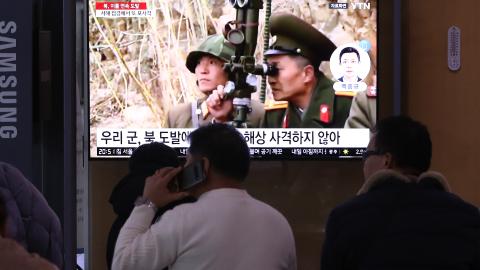If Kim Jong-un is preparing for a war, it is one that he should not want and cannot win. He lacks a plausible theory of victory regardless of how many missiles he tests.
A single violent act would invariably ignite a punishing reprisal from an armed and ready U.S.-South Korean combined force. If the North Korean navy today were to attempt a deadly sneak attack on a South Korean vessel, like the one that killed 46 sailors in 2010, Pyongyang would be bracing for a stern counterattack. The sinking of ROKS Cheonan, along with the shelling of Yeonpyeong Island in November of that same year, pressed allied military forces to prepare deadly response to limited aggression.
Mr. Kim's reluctance to pull the trigger on lethal force suggests he understands the military balance of power. Rolling the dice on the notion that the Korean People's Army Strategic Force has found a gaping hole in alliance capabilities or political will would be a tragic miscalculation. Escalation would not end well for the Kim regime, and North Korea's conventional armed forces and economy are ill-equipped for a protracted war.
Deterrence is never guaranteed, as Russia's invasion of Ukraine reminds us. Still, it is instructive that the war of aggression has ground on for two years, at a frightening cost and with little to show for it, without the use of a nuclear weapon.
Vladimir Putin, a strongman's strongman whose military is brimming with strategic and tactical nuclear weapons, has threatened but never used one.
Does deterrence hypnotize Putin? Maybe he understands nuclear weapons are superior instruments for terrorizing but lousy for warfighting. The specter of Russian battlefield nuclear weapons has curbed NATO's enthusiasm to provide aircraft, missiles, and other major arms to Ukraine.
Putin and Kim's efforts to make nuclear weapons look usable have created a symbiotic effect: Putin's threats to use battlefield nukes make North Korea’s acquisition of them more terrifying; Kim’s push to acquire tactical nuclear weapons makes Russian threats seem more credible.
Kim Jong Un sees the peacetime advantages of becoming a permanent nuclear-weapon state. Every new missile is extra insurance against a sudden decapitation strike, tangible proof of Mr. Kim's fatherly determination to protect his people from menacing external actors, and added street cred among the club of nuclear-armed revisionist powers.
Amid Mr. Kim’s decision to focus on arms, not weal or diplomacy, the Biden and Yoon administrations must remain steadfast and open to dialogue. Prioritizing risk avoidance at all costs will invite lower-level provocations; blaming ourselves for the level of confrontation lets Pyongyang evade responsibility.














